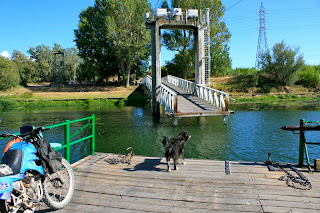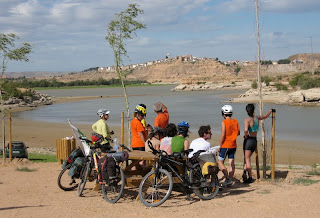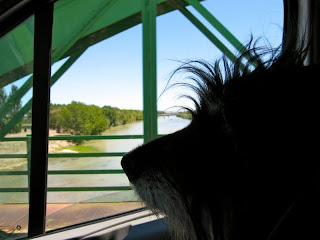Miravet-Deltebre (75 kms)
Huge scare this morning, as Wilbur, who was calmly sitting in the front seat of the van, started convulsing, his body and legs contorting and cramping for 2 minutes, then 20 more minutes for his muscles to relax, his eyes to come back and his breathing to become regular, then another hour before he could lift his head. Annelies calls an emergency vet in Tortosa, gives me the phone, and she informs me the symptoms I describe are that of an epilepsy attack.
So I leave the group and head directly to Tortosa, which is where we are getting together with local members for lunch. I had breakfast while I waited for the test results from the vet, which turned out just fine, the vet explains how these episodes are not unusual, that it may be just a one time incident, and to watch over him in case it would happen again to keep his head in a position that would avoid him drowning in his vomit.
I head over to the Pabello Firal, where the locals are already busy preparing a lovely lunch, and since it’s still early, I shower and grab the bike to go for a a visit of the old downtown of Tortosa, in hopes to buy a new pair of sunglasses, but after seeing the prices I decide to live without, at least for the time being.
The group finally arrives, and during lunch, Paco, the local member who was nice enough to take the time to post signs along the way the past couple of days, to keep the group from getting lost, tells me of some of the local issues with the river, and mentions one emerging problem that nobody has yet presented, and that is the huge amounts of chemical salt scattered on the winter roads that are adding to the deterioration of the quality of the water.
 Francois, who joined the group recently. and has a marvellous ability to play his flute while riding his bike, iniciates a jam session during the “sobre mesa” (after lunch conversations). And while others are showering or enjoying a siesta, I ask Jordi to accompany me to climb up to the castle walls, as Pepa mentioned to me earlier, Tortosa is known to have the longest wall in all of Europe, part Iberian, part Roman, part low and high Medieval and even part Contemporary.
Francois, who joined the group recently. and has a marvellous ability to play his flute while riding his bike, iniciates a jam session during the “sobre mesa” (after lunch conversations). And while others are showering or enjoying a siesta, I ask Jordi to accompany me to climb up to the castle walls, as Pepa mentioned to me earlier, Tortosa is known to have the longest wall in all of Europe, part Iberian, part Roman, part low and high Medieval and even part Contemporary. Before continuing to Deltebre, which is our final destination (yes, it “is” coming to an end, which I know, you’ve been wondering about) we first go down to a section of the river to take more photos for the media, while chanting: “lo riu es vida, no al transvasement” ( the river is life, no to the trasvase).
Before continuing to Deltebre, which is our final destination (yes, it “is” coming to an end, which I know, you’ve been wondering about) we first go down to a section of the river to take more photos for the media, while chanting: “lo riu es vida, no al transvasement” ( the river is life, no to the trasvase).Paco leads the vehicles out of Tortosa, and I take over the lead to Deltebre, and find the “Camp de Futbol” (soccer stadium), where we will sleep the next two nights.
We all get together over the bridge where a very young group of kids recieves us with a Batukada, which is a very emotional moment, tears, laughter, joy, and I can’t believe my eyes when I see Marisa, my friend from Cantabria who had left the group back in Logrono, she said she would try to come back, and she did. Manolo also came back a little later that evening with a small group from Madrid.
It had been a very long day, so while the town threw us a party that started around 1am, and was a bit far, those who did go, were partying threw the night, some called it in, and I wanted to spend time with Marisa, so we went with Jordi, Alene and her husband to a nearby hotel to have some beers and play pool.
Deltebre-Desembocadura-Deltebre
 Wilbur ran alongside my bike, about 8 miles towards the ferry that will take the group to the spot where river meets the Mediterranian Sea, but upon boarding, the captain refuses to let Wilbur on board, so I take Reme’s car to try to catch Polet, but I’m too late, they’re already off meeting with the ferry. I go as far as I can, to take pictures while they symbolically deliver the sediments collected along the way.
Wilbur ran alongside my bike, about 8 miles towards the ferry that will take the group to the spot where river meets the Mediterranian Sea, but upon boarding, the captain refuses to let Wilbur on board, so I take Reme’s car to try to catch Polet, but I’m too late, they’re already off meeting with the ferry. I go as far as I can, to take pictures while they symbolically deliver the sediments collected along the way. Suddenly a sadness takes over in my mind, while I’m standing here with Wilbur next to me, watching my friends only less than a mile away, with flashbacks of the trip from the first day at the birth of the river, and now to be left back just 1 kilometer from the end, I began to cry. I left, but I couldn’t shake off the sadness, I went to buy some meat for Wilbur and back to the empty stadium, read a book for awhile, then when I went to take a shower, I saw a single sheet of paper on the wall that read: “you need to change any situation from negative to a positive one”. That was all it took, to clear my mind that was playing tricks on me; took a shower and joined my friends for lunch. However I still wanted to get “there”, so when Tom asked if he could borrow the canoe, I told him he could if he took me to the desembocadura.
First he had to go help move our tents at the soccer field as the townspeople were having an event there, while I joined other follow a tour leader for some bird watching, Later Tom and I took the canoe out, I left Wilbur in the van, as I was afraid of rolling it over, cause of the wavy currents, which left enough room in the canoe to collect large trash objects that we found there.
We rushed to get a sandwich for dinner in order to make it on time to see the Teatro Participatorio that Natalia and a few volunteers had prepared for us, I had mentioned it before, and while I very much wanted to volunteer, I was either late, or to tired to participate in the rehearsals. Luckily we have awesome younger people with energy and willingness to spare, so Leo, Pablo, Marta, Demeza and LP played out the scene, that was later reproduced several times along with members of the public who had ideas on how to improve the story being told. And while it was a wonderful effort with great results on moving the viewer to take action, it had been another long day, and I wasn’t the only one that was having a hard time keeping my eyes open, and yet we still took the time to celebrate Marta’s birthday and again being led by Natalia on another ingenious exercise of hand holding and creating swaying, moving line where we crossed looking each other deep into our eyes as a way of remembering everyone present before saying goodbye and collecting as many emails as I could.
Going Home
 I got up at 7am to go potty, and found all the vans leaving, one to Madrid, one to Bilbao and Jordi was taking 5 people to Tortosa to catch trains and buses. I said goodbyes again and went back to sleep till 9am, which I got up in a flash, as I was theoretically supposed to have packed all the tents and bags by the time Jordi got back; of course he arrived 5 minutes later and I was far from done. I was saddened again when I realized that Marisa had already left, which later I found out that she left thinking that we had gone and was taken by her own melancholy.
I got up at 7am to go potty, and found all the vans leaving, one to Madrid, one to Bilbao and Jordi was taking 5 people to Tortosa to catch trains and buses. I said goodbyes again and went back to sleep till 9am, which I got up in a flash, as I was theoretically supposed to have packed all the tents and bags by the time Jordi got back; of course he arrived 5 minutes later and I was far from done. I was saddened again when I realized that Marisa had already left, which later I found out that she left thinking that we had gone and was taken by her own melancholy. After all was packed, the much smaller group remaining was easily swayed by our local members, Josep, Jon and Lluch to go to the beach, which we did, we all went to El Trabucador, on the other side of the Delta; but first we had to leave the stadium, which also meant leaving behind a very sweet little dog that we found on arrival here, obviously homeless, and while many of us thought about taking her, it was Lluch who actually stood up to the plate and adopted her as his own and named her Ebreta, in honor of the river that we had enjoyed all these days.
After all was packed, the much smaller group remaining was easily swayed by our local members, Josep, Jon and Lluch to go to the beach, which we did, we all went to El Trabucador, on the other side of the Delta; but first we had to leave the stadium, which also meant leaving behind a very sweet little dog that we found on arrival here, obviously homeless, and while many of us thought about taking her, it was Lluch who actually stood up to the plate and adopted her as his own and named her Ebreta, in honor of the river that we had enjoyed all these days. While nobody was in a hurry to go home, and the locals kept finding ways to delay our departure, it was already 7pm and we still had a couple of hours to reach Barcelona where we dropped off Annelies, Pablo, Lidia and Alexis before home.


















































